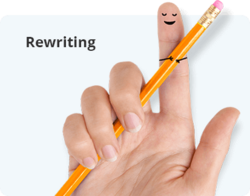Rewriting NHMRC investigator grant application

Dr. Den-Ching (Angel) Lee
Rehabilitation, Ageing and Independent Living (RAIL) research centre at Monash University
Rewriting NHMRC investigator grant application
I am an Early Career Researcher at Monash University and a physiotherapist. This year I will be rewriting the NHMRC Emerging Leadership 1 (EL1) investigator grant application after two unsuccessful attempts. I thought I would share my experience and reflections on the comments that reviewers had provided me, and hopefully you will also find them useful for writing your application.
I would suggest you seek advice from your organisation’s research office and your supervisors and mentors for writing the application because my field of research, experience and personal circumstances are likely to be different from yours. Also ensure you read the NHMRC guidelines and instructions for applicants because these may change from the previous year.
It is important to make the case for “relative to opportunity” post-PhD if this applies to you. The reviewers will assess your track record against this, and the FTE you actively spent in research. Career disruption has been stated in previous applications by the NHMRC as parental leave, extended sick leave or carer’s leave. My experience is that ‘career disruption’ does not include working in other non-research jobs or unemployment post-PhD. Last year, I was able to enter this type of information into the career context section.
For the “Publications” section, it does take a lot of consideration as to which five publications you put as your “Top 5 in 10”. Ultimately, the reviewers are looking for strong impact papers, strong FWCI and journal quality. You may have to weigh up the pros and cons of putting in higher impact papers with you as a co-author versus lower impact papers with you as the first author. Ideally you would have both high impact papers and you as the first author. The reviewers are also looking for the number of first author papers that you have published in total.
For the “Research impact” section, the reviewers are looking at the clarity in which your selected publications has impacted on policy and how they have contributed to science. Quantifying your research impact on these would definitely help. They are also interested in how you conceived novel ideas in the research program, and how your research work facilitated the research program.
For the “Research leadership” section, the reviewers are looking at your capacity for building collaborative work, evidence of research mentoring or training beyond the traditional student supervision, such as playing leadership roles in your institution and performing outreach activities. It would also boost your application if you can add some quantitative data to support your claims.
“Knowledge gain” is the research proposal section. Generally, I found that the reviewers preferred less text heavy proposals. Some could also be looking for “value for money” so make sure that your proposal contains the right amount of work that warrants a 5-year funding, but do not go overboard.
Finally, it is a good practice to invite researchers from other fields to critique your application. In 2021, the average success rate of the NHMRC investigator grant was 14.8% across all levels. Whilst it is very competitive, you have nonetheless “got to be in it to win it”. In a way, these EL investigator grants are “carved out” for researchers that have a straight research career path and have researched in one consistent area from their PhD to post-doc years evidencing a focussed track record in their research area. After all, the track record (“Publications”, “Research impact” and “Research leadership”) accounts for 70% of the assessment criteria in the investigator grant application (2021’s assessment criteria). You may consider additional strategies and opportunities such as project grants which may rely less on your personal track record if this is the case. Good luck!